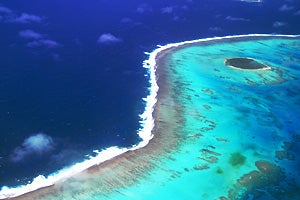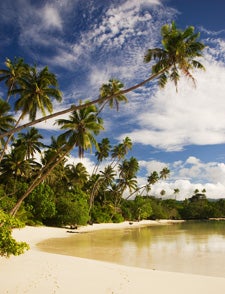 It is well understood that climate change poses specific dangers for small island developing states. Less commented on is another threat: the vulnerability of these states to the repercussions of energy insecurity.
It is well understood that climate change poses specific dangers for small island developing states. Less commented on is another threat: the vulnerability of these states to the repercussions of energy insecurity.
Pacific islands are some of the most vulnerable. Spread out over a huge expanse of ocean, pooling power among countries is not the option that it is for other regions. Lacking fossil fuel resources, many of these states are forced to import oil products over long distances. When prices spike, these countries are among the hardest hit.
Global oil prices have now been volatile for ten years, compared with historical trends, with sharp volatility characterizing the markets since late 2007. During this period, the World Bank has been engaged with developing countries to help them manage and mitigate this volatility so that it does not hamper the development or extension of energy services to poor communities.
One example of this engagement is the report “Mitigating Vulnerability to High and Volatile Oil Prices: Power Sector Experience in Latin America and the Caribbean”, supported by the Energy Sector Management Assistance Program (ESMAP) and published in July 2012. The report distills the best practices from the experience of countries in Central America and the Caribbean in responding to high oil prices.

One of the authors of the report, Ariel Yépez, recently traveled to the Pacific to share the findings and recommendations with officials from island states, as part of ESMAP’s ongoing work to exchange knowledge across regions on common energy challenges. This included a regional workshop with representatives from a number of Pacific states in Suva, Fiji on 17-23 June, and a follow-on advisory meeting with officials in Tonga. At the workshop, he outlined three of the primary options described in the report that countries can take to limit their exposure to oil price volatility: exploring available renewable power generation options, increasing investments in energy efficiency both on the supply and demand sides, and using financial hedging instruments to mitigate petroleum price risk.
“The Fiji workshop brought together government officials, regulators, the utilities, the local distribution companies and the private sector,” said Ariel Yépez. “It was the first regional event on this topic for a number of years, so it was an excellent opportunity to discuss these options.”
Beyond oil prices, the main concerns of officials from island states present at the workshop were improving infrastructure and storage, and how best to scale up renewables.
 While many Pacific island states lack fossil fuel resources, they are rich in sun, wind and biomass from coconut trees. With the worldwide price of solar photovoltaic panels having come down considerably in price in recent months, solar has become a more realistic option for island states. Wind is also abundant in some areas, though maintenance costs can be an issue. And coconut tree biomass can be used as an alternative energy source for power generation.
While many Pacific island states lack fossil fuel resources, they are rich in sun, wind and biomass from coconut trees. With the worldwide price of solar photovoltaic panels having come down considerably in price in recent months, solar has become a more realistic option for island states. Wind is also abundant in some areas, though maintenance costs can be an issue. And coconut tree biomass can be used as an alternative energy source for power generation.
However, while all of these options can supplement existing power generation, in the near term they will not be sufficient to supplant oil generation for most island states. To mitigate costs, fossil fuel power must be generated and consumed much more efficiently. This can take the form of retrofits to ageing oil-fired power plants and reconfiguring supply and distribution configurations on the supply side, and through smart metering and programs that encourage efficient consumption on the demand side.
The workshop also considered price risk management instruments that were covered in the report. These include physical instruments such as bulk purchases and forward contracts, and financial instruments such as exchange-traded futures, swaps and commodity-linked bonds. The challenge for Pacific island nations is to find enough resources to make these investments meaningful, and to develop the capacity to manage them.
For Ariel Yépez, the option with the greatest potential is efficiency, particularly on the demand side. While there have been efforts to increase the efficiency of power plants, demand-side management tools have been less explored, he said.
The scale up of renewable power is also important, but as an energy security strategy to diversify the energy mix, rather than a climate change mitigation strategy.
“With small islands, you are talking about vulnerability, not mitigation,” he emphasized.
For more on the energy challenges faced by small island states, see the recent blog post Small Island States Set Ambitious Energy Agenda for Rio+20.


Join the Conversation